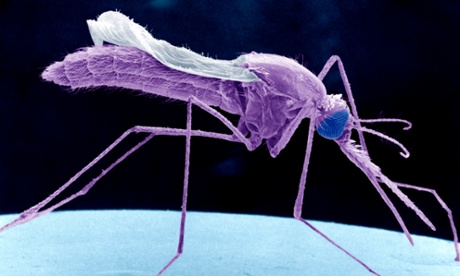Australian scientists starve parasite of crucial proteins, providing a target for the development of new antimalarials

Australian researchers have made a major breakthrough in the race to find new medicines to eliminate malaria, as resistance increases to the only drug left to treat the disease.
Scientists from the Burnet Institute, Deakin University and Monash University were able to starve the malaria parasite of important proteins essential to its survival, providing a target for the development of new antimalarial drugs.
The malaria parasite exists inside a red blood cell – which allows it to go undetected by the immune system, but is not an ideal environment for the parasite to grow and thrive.
A co-author of the paper, published in Nature, Tania de Koning-Ward from Deakin’s medical school, said it meant the parasite had to “renovate” its environment by sending hundreds of its own proteins into the red blood cell for it to feed on.
“What our research has shown is those proteins can only get access to the red blood cell through one gateway, which provides a channel for the proteins to get into the red blood cell so that it can live and multiply,” she said.
“We managed to alter the function of this gateway so that these proteins can no longer get into the red blood cells, starving and killing the parasite.”
In 2009 researchers first discovered the malaria parasite obtained the proteins it needed through a gateway. But they were unsure whether blocking that gateway meant the parasite would simply find another one. Parasites are notoriously good at adapting.
That meant convincing drug companies to invest in developing drugs to block the gateway had been a hard sell until now, De Koning-Ward said.
“What we have shown through this research is the parasite uses just this one gateway to obtain those proteins, which makes that gateway a great target for drug treatments.”
As parasites develop resistance to drugs, researchers often tweak them slightly to make them harder for the parasite to fight. But the parasite often quickly develops resistance to the newer versions.
Artemisinin – the only drug left to treat malaria – and the drug that came before it, chloroquine, both worked by giving the malaria parasite what was essentially a bad case of indigestion, preventing it from being able to eliminate a build-up of iron that occurs after it ingests haemoglobin.
Another co-author of the study, Dr Paul Gilson, senior research officer at Burnet Institute, said the new research meant drug companies could now change their tactic completely. Instead of blocking the parasite’s ability to detoxify the iron ingested, they could target the gateway it used to get the “food”.
“It means that when a drug that blocks the gateway is developed, it may take a lot longer for the malaria parasite to develop resistance to it, because it will never have seen a drug like this before,” he said.
Resistance to artemisinin has already occurred in parts of south-east Asia.
Gilson believes drugs that target the gateway could be ready within a few years, but said they would then need to undergo trials that could take up to another 10 years.
“But the cupboard of drugs available to treat malaria is currently pretty bare,” Gilson said. “Our research provides an important new focus for drug development.”
Malaria is spread via mosquitoes and its most lethal form is caused by the parasite plasmodium falciparum. More than 200 million people get malaria each year and more than half a million of those, mainly children, die from the disease.
The rapid growth in population movements meant there was a risk resistant malaria might reach other countries more quickly, Gilson said. While resistant malaria is not impossible to treat, it takes a lot longer.
